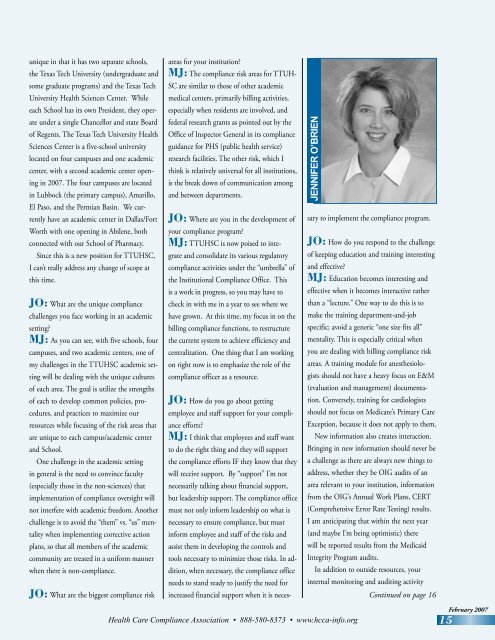Mildred L. Johnson, JD, CPC - Health Care Compliance Association
Mildred L. Johnson, JD, CPC - Health Care Compliance Association
Mildred L. Johnson, JD, CPC - Health Care Compliance Association
Create successful ePaper yourself
Turn your PDF publications into a flip-book with our unique Google optimized e-Paper software.
unique in that it has two separate schools,<br />
the Texas Tech University (undergraduate and<br />
some graduate programs) and the Texas Tech<br />
University <strong>Health</strong> Sciences Center. While<br />
each School has its own President, they operate<br />
under a single Chancellor and state Board<br />
of Regents. The Texas Tech University <strong>Health</strong><br />
Sciences Center is a five-school university<br />
located on four campuses and one academic<br />
center, with a second academic center opening<br />
in 2007. The four campuses are located<br />
in Lubbock (the primary campus), Amarillo,<br />
El Paso, and the Permian Basin. We currently<br />
have an academic center in Dallas/Fort<br />
Worth with one opening in Abilene, both<br />
connected with our School of Pharmacy.<br />
Since this is a new position for TTUHSC,<br />
I can’t really address any change of scope at<br />
this time.<br />
JO: What are the unique compliance<br />
challenges you face working in an academic<br />
setting?<br />
MJ: As you can see, with five schools, four<br />
campuses, and two academic centers, one of<br />
my challenges in the TTUHSC academic setting<br />
will be dealing with the unique cultures<br />
of each area. The goal is utilize the strengths<br />
of each to develop common policies, procedures,<br />
and practices to maximize our<br />
resources while focusing of the risk areas that<br />
are unique to each campus/academic center<br />
and School.<br />
One challenge in the academic setting<br />
in general is the need to convince faculty<br />
(especially those in the non-sciences) that<br />
implementation of compliance oversight will<br />
not interfere with academic freedom. Another<br />
challenge is to avoid the “them” vs. “us” mentality<br />
when implementing corrective action<br />
plans, so that all members of the academic<br />
community are treated in a uniform manner<br />
when there is non-compliance.<br />
JO: What are the biggest compliance risk<br />
areas for your institution?<br />
MJ: The compliance risk areas for TTUH-<br />
SC are similar to those of other academic<br />
medical centers, primarily billing activities,<br />
especially when residents are involved, and<br />
federal research grants as pointed out by the<br />
Office of Inspector General in its compliance<br />
guidance for PHS (public health service)<br />
research facilities. The other risk, which I<br />
think is relatively universal for all institutions,<br />
is the break down of communication among<br />
and between departments.<br />
JO: Where are you in the development of<br />
your compliance program?<br />
MJ: TTUHSC is now poised to integrate<br />
and consolidate its various regulatory<br />
compliance activities under the “umbrella” of<br />
the Institutional <strong>Compliance</strong> Office. This<br />
is a work in progress, so you may have to<br />
check in with me in a year to see where we<br />
have grown. At this time, my focus in on the<br />
billing compliance functions, to restructure<br />
the current system to achieve efficiency and<br />
centralization. One thing that I am working<br />
on right now is to emphasize the role of the<br />
compliance officer as a resource.<br />
Jennifer O’Brien<br />
JO: How do you go about getting<br />
employee and staff support for your compliance<br />
efforts?<br />
MJ: I think that employees and staff want<br />
to do the right thing and they will support<br />
the compliance efforts IF they know that they<br />
will receive support. By “support” I’m not<br />
necessarily talking about financial support,<br />
but leadership support. The compliance office<br />
must not only inform leadership on what is<br />
necessary to ensure compliance, but must<br />
inform employee and staff of the risks and<br />
assist them in developing the controls and<br />
tools necessary to minimize those risks. In addition,<br />
when necessary, the compliance office<br />
needs to stand ready to justify the need for<br />
increased financial support when it is necessary<br />
to implement the compliance program.<br />
JO: How do you respond to the challenge<br />
of keeping education and training interesting<br />
and effective?<br />
MJ: Education becomes interesting and<br />
effective when it becomes interactive rather<br />
than a “lecture.” One way to do this is to<br />
make the training department-and-job<br />
specific; avoid a generic “one size fits all”<br />
mentality. This is especially critical when<br />
you are dealing with billing compliance risk<br />
areas. A training module for anesthesiologists<br />
should not have a heavy focus on E&M<br />
(evaluation and management) documentation.<br />
Conversely, training for cardiologists<br />
should not focus on Medicare’s Primary <strong>Care</strong><br />
Exception, because it does not apply to them.<br />
New information also creates interaction.<br />
Bringing in new information should never be<br />
a challenge as there are always new things to<br />
address, whether they be OIG audits of an<br />
area relevant to your institution, information<br />
from the OIG’s Annual Work Plans, CERT<br />
(Comprehensive Error Rate Testing) results.<br />
I am anticipating that within the next year<br />
(and maybe I’m being optimistic) there<br />
will be reported results from the Medicaid<br />
Integrity Program audits.<br />
In addition to outside resources, your<br />
internal monitoring and auditing activity<br />
Continued on page 16<br />
<strong>Health</strong> <strong>Care</strong> <strong>Compliance</strong> <strong>Association</strong> • 888-580-8373 • www.hcca-info.org<br />
February 2007<br />
15

















